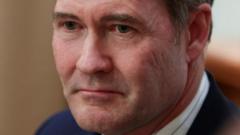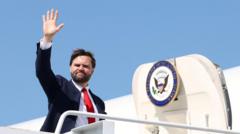Following the designation of the Alternative für Deutschland (AfD) as a right-wing extremist party, Germany's Foreign Office emphasizes the historical importance of combating extremism, despite accusations from U.S. officials claiming the classification resembles "tyranny in disguise."
Germany Stands Firm on AfD's Extremist Label Amid U.S. Backlash

Germany Stands Firm on AfD's Extremist Label Amid U.S. Backlash
Germany's Foreign Office defends its classification of the AfD party as extremist in response to criticism from U.S. officials, including VP Marco Rubio and JD Vance.
Germany's Foreign Office is staunchly defending its recent decision to classify the Alternative für Deutschland (AfD) party as a right-wing extremist group, amid sharp backlash from U.S. officials including Vice-President JD Vance and Secretary of State Marco Rubio. In a striking condemnation, Vance accused "bureaucrats" of reconstructing the Berlin Wall, while Rubio labeled the designation as "tyranny in disguise."
The Foreign Office responded directly to Rubio's critique on X, asserting, "We have learnt from our history that right-wing extremism needs to be stopped." This follows the findings of Germany's intelligence agency, the Bundesamt für Verfassungsschutz (BfV), which reported that the AfD's ideology conflicts with the principles of Germany's democratic order, particularly its views on ethnicity and belonging.
The AfD, which secured 152 seats in the federal parliament during the latest elections — marking its position as the second strongest party — has faced increased scrutiny. Initial classifications by the BfV noted the party's rising popularity particularly in three eastern states, extending the designation to encompass the entire party as a result of its exclusionary stance towards certain population groups, notably targeting citizens from predominantly Muslim countries.
Joint leaders of the AfD, Alice Weidel and Tino Chrupalla, have decried the classification as politically motivated, describing it as a grievous affront to German democracy. Their deputy parliamentary leader, Beatrix von Storch, voiced similar sentiments, framing the ruling as characteristic of authoritarian regimes.
Under this new classification, authorities are empowered to employ heightened surveillance methods against the AfD, sparking further outrage from U.S. lawmakers. Rubio condemned the measures as undemocratic, while the German Foreign Office reaffirmed its position, emphasizing procedural thoroughness and the possibility for appeal.
JD Vance, who recently expressed support for the AfD during a speech at the Munich Security Conference, remarked on the disheartening reversal of progressive freedoms in Germany: "The West tore down the Berlin Wall together. And it has been rebuilt - not by the Soviets or the Russians, but by the German establishment."
As the political landscape in Germany shifts, discussions are intensifying regarding the potential for banning the AfD, with SPD leader Lars Klingbeil warning of the party's intent to undermine democracy. The upsurge in political rhetoric comes as Germany prepares for crucial votes, including one that could confirm conservative leader Friedrich Merz as the new chancellor.




















